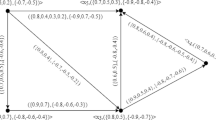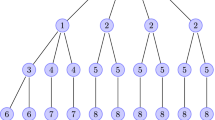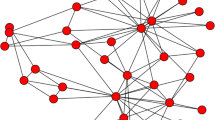Abstract
Many economic and social situations can be represented by a digraph. Both local and global methods to determine the strength or power of all the nodes in a digraph have been proposed in the literature. We propose a new method, where the power of a node is determined by both the number of its successors and the powers of its successors. Our method, called the positional power function, determines a full ranking of the nodes for any digraph. The positional power function can either be determined as the unique solution to a nonhomogeneous system of equations, or as the limit point of an iterative process. The solution can easily be obtained explicitly, which enables us to derive a number of interesting properties of the positional power function. We also consider the Copeland variant of the positional power function. Finally, we extend our method to the class of all weighted graphs.
Similar content being viewed by others
Author information
Authors and Affiliations
Corresponding author
Additional information
The authors like to thank two anonymous referees for their valuable comments. The first author would like to thank the Netherlands Organisation for Scientific Research (NWO) for financial support.
Rights and permissions
About this article
Cite this article
Herings, P.JJ., Laan, G.v.d. & Talman, D. The positional power of nodes in digraphs. Soc Choice Welfare 24, 439–454 (2005). https://doi.org/10.1007/s00355-003-0308-9
Received:
Accepted:
Issue Date:
DOI: https://doi.org/10.1007/s00355-003-0308-9




